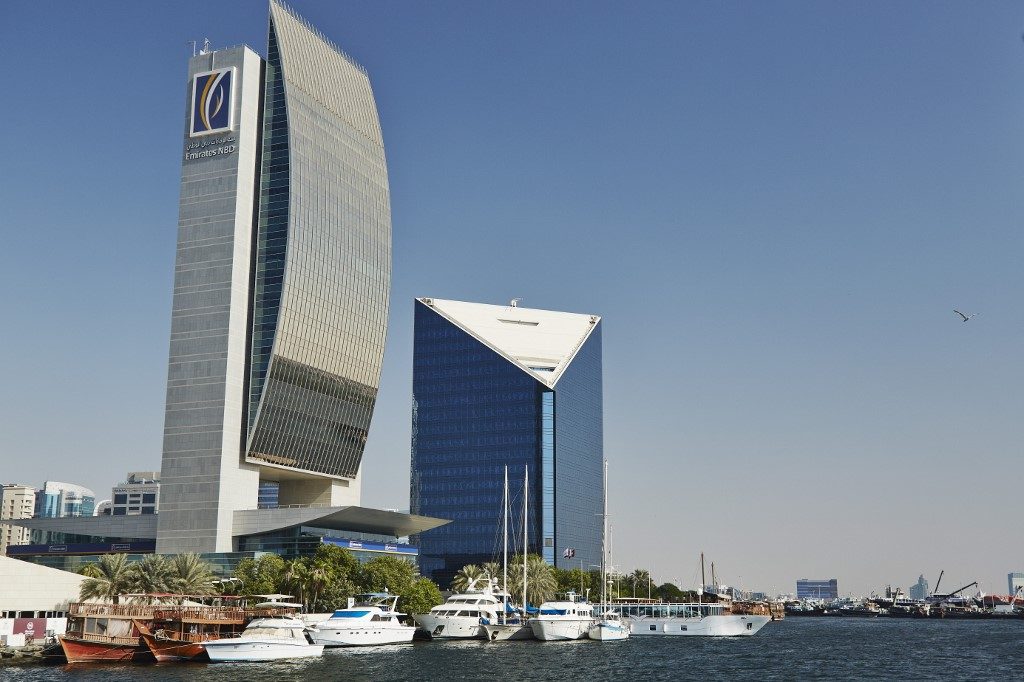São Paulo – The non-oil private sector in the United Arab Emirates increased in May to hit its highest since October 2014, as per a survey by the Emirates NBD (pictured, left), one of the leading banks in the Middle East. The survey was published on Monday (10) by Thomson Reuters’ economic news website Zawya.
The NBD’s Purchasing Managers’ Index (PMI) rose to 59.4 in May from 57.6 in April. According to Zawya, an index reading above 50 indicates an increase, and readings below 50 show a decrease. The PMI tracks industry and services activities.
The growth, however, didn’t translate into job creation, which remained broadly unchanged during the month, according to Zawya, although new orders and business activity have increased.
Stronger market demand, marketing activity and the start of new projects all contributed to the result. Companies expect growth to continue over the coming year, the bank said.
According to the website, new export orders rose, at the fastest pace in the near ten-year survey history, spurred by new business from Saudi Arabia and Oman.
Emirates NBD head of MENA research Khatija Haque said price discounts and new orders drove output growth, although employment and wages remained almost stagnant, which shows the companies are reluctant to hire additional staff. “The environment remains a challenging one for businesses,” said Haque, according to Zawya.
Saudi Arabia

In Saudi Arabia, the non-oil private sector growth rose to a 17-month high in May. However, the website stresses that the point of comparison is low, since Saudi economy was subdued last year as it felt the impact of fuel price hikes, the introduction of a 5% value-added tax and the higher cost of hiring foreign workers.
Emirates NBD Saudi Arabia Purchasing Managers’ Index rose to 57.3 points in May from 56.8 in April. Year through May, it reachs 56.8 points against last year’s average of 53.8. “The gradual rise in the headline PMI this year suggests that growth in the kingdom’s non-oil private sector is recovering after a relatively soft 2018,” said Haque.
Output rose, reflecting the improved demand. Job creation accelerated slightly, though it is still weak.
Egypt
On the other hand, Egypt’s non-oil private sector contracted last month after its first expansion in eight months in April. The Emirates NBD Egypt PMI weakened to 48.2 in May from 50.8 the previous month. A reading below 50 separates growth from contraction. A sub-index for output also saw a contraction.
Emirates NBD MENA economist Daniel Richards said Egypt’s private sector was bearing the brunt of economic reforms and that would likely remain a pressure for several months.

“While easing price growth in recent months – CPI inflation fell to 13.0% y/y in April – has offered some respite, upcoming subsidy reforms and a renewed pause in the CBE’s cutting cycle mean that conditions remain difficult for private firms,” said Daniel Richards, according to Zawya.
According to the website, Egypt is due to lift remaining fuel subsidies on energy products, part of reforms tied to a USD 12 billion International Monetary Fund (IMF) loan from 2016. Along with cuts to subsidies, Egypt has its currency – pounds – to float and introduced a value-added tax under the deal.
“The dip back below 50 was driven by both output and new orders”, said Richards. External demand of Egypt’s private goods and services have also dropped.
Future output sentiment softened, however. “Although private Egyptian companies will remain under pressure over the summer months, we maintain our outlook that conditions will improve,” Richards said.
Translated by Guilherme Miranda




